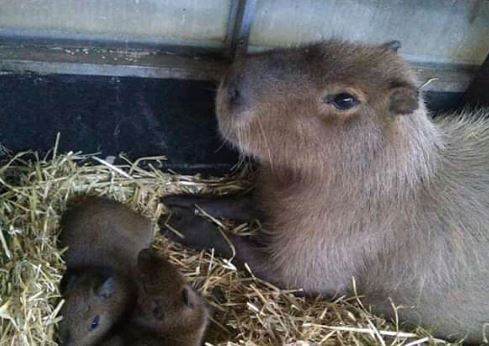Capybara Vomiting Causes and Remedies
If you’ve had a Capybara throw up in your house or yard, you know how interesting these animals can be. If you have any questions about what happened or how to fix it, feel free to contact your vet and they will do their best to answer your questions. So below are the causes of vomiting in capybaras and how to remedy it.
GI Obstruction
Our pet capybara, Pascal, was one of the most curious creatures we’ve ever owned. He used his teeth like a giant spoon to get everything he wanted out of his bowl. One day he ate some grass and puked it all up into the air just as I was walking into the kitchen. It landed on me while I was making breakfast and then on my shoes when I let them down from my shoulders without putting them on before leaving for work. We were surprised that he got that much grass in him because we normally keep him on a well-padded diet and he’s always eager for food. He’d eat anything except anything with seeds or nuts (but still hey…). We also knew that we couldn’t get rid of this grass because the next time he eats something else there’s a good chance that this will happen again!
So what did we do? We took him to our wonderful veterinarian who quickly took care of his problem by making sure that there wasn’t any foreign material causing the blockage: each time Pascal is sick or has caused someone else harm (he’d even try to bite people!), they’re going through similar procedures so they could make sure that there aren’t any problems with their digestive system!
Undigested Food
- If you notice that there are undigested pieces of food in the vomit, this is a good sign and means that there is nothing wrong with your capybara’s digestive system. However, it can also mean that they are eating too quickly or have an upset stomach.
Gastritis
Gastritis is a common ailment of capybaras and refers to inflammation of the stomach lining. It’s an extremely painful condition, but there are several options for treatment.
- Natural remedies: Keep your capybara on a diet of grass, alfalfa pellets, and limited amounts of hay. Feeding it an excessive amount of high-protein foods like beans can trigger gastritis. Additionally, long-term antibiotic use has been linked to the development of this condition.
- OTC medications: Over-the-counter medicines you may find at the grocery store are effective at treating mild cases of gastritis in capybaras. However, you should consult with your veterinarian if you intend on treating your pet with medication from the store.
- Prescriptions: In severe cases, a prescription anti-inflammatory drug might be necessary to heal more serious levels of gastritis in your pet capybara.
Cholangiohepatitis
Cholangiohepatitis is a disease of the liver and bile ducts in the liver. It is a common problem in capybara in many parts of the world. It is often fatal if not treated. The liver can become scarred, hard and lumpy, and does not function properly.
You may notice your capybara vomiting (throwing up), refusing to eat, eating poorly, losing weight, and being lethargic (tired). He may also develop jaundice (yellowing of gums, eyes), have an enlarged stomach from water retention, and be drinking excessively (polydipsia) or urinating excessively (polyuria).
Kidney Failure
It’s also important to note that kidney failure is not uncommon in older capybaras. It can be due to a urinary tract infection or a kidney infection. Another reason for kidney failure is the formation of calculi, commonly referred to as kidney stones. Kidney stones are usually caused by mineral imbalances in the body, and if left untreated, it can lead to chronic renal failure and eventually cause your pet [c]apybara’s death.
Also, note that congestive heart failure (CHF) is another leading cause of chronic renal failure in capybaras and other rodents alike. With this condition, the heart becomes too weak to properly pump blood throughout the capybara’s body, which can cause kidney damage over time.
If your [c]apybara has developed any of these conditions, consult with your vet as soon as possible to keep them from getting worse and causing even more serious health issues for your beloved pet!
Pancreatitis
One possible cause of vomiting in a capybara is acute pancreatitis, which occurs when the pancreas becomes inflamed. The pancreas is an organ that plays a role in digestion, and pancreatitis can be life-threatening. In chronic cases, it can also be painful and debilitating.
Risk factors for developing pancreatitis include obesity, diabetes, eating a high-fat diet, being overweight or underweight, excessive use of alcohol or certain medications (such as corticosteroids), and genetic predisposition.
Treatment for canine pancreatitis includes fasting; intravenous fluids; antibiotics to kill any bacteria that may be present in the pancreas; pain medication; antiemetics to reduce nausea; and eliminating the risk factors that may have contributed to the condition.
Bladder Stones
Bladder stones are one of the most common reasons for vomiting in capybaras. They’re caused by crystals forming in the urine, which then form stones that back up into the bladder and make it hard for your pet to urinate. A capybara with bladder stones may have a painful abdomen, swollen urethra, blood in his urine, or dribbling of urine with straining to urinate.
X-rays can detect bladder stones, but ultrasound is best at confirming their presence and also identifying any other possible causes of your pet’s vomiting.
Treatment for bladder stones is usually surgical removal under general anesthesia—which can be a serious surgery for an animal as large as a capybara. Some types of bladder stones can be dissolved through diet changes and medication, but this is not an option if they’re made of struvite or calcium oxalate crystals.
Most importantly: preventing bladder stones is an easier task than curing them! Your vet will need to know your water source (city versus well water) and may recommend using spring water from the store instead if there are high mineral content issues with your tap water. Changing your pet’s diet to less processed foods can reduce some types of crystal formation too; feeding raw cabbage or broccoli several times a week helps acidify the urine so that struvite crystals aren’t likely to form.
INGESTED FOREIGN OBJECT
When a capybara ingests a foreign object, he may experience vomiting. This can be tough to watch as a pet owner, but rest assured that it is usually not life-threatening if your pet has access to fresh water and food.
It’s important to consult with a veterinarian when you notice your capybara has been vomiting. Your vet will conduct tests to determine the cause of the vomiting and preventative measures for future occurrences. You can also discuss appropriate treatment options if needed.
However, there are some immediate precautions you can take that can help alleviate symptoms:
- Be sure your capybara has access to fresh water and food (ideally warmed up) to ensure he stays hydrated and nourished during the illness. Capybaras have delicate stomachs so it’s important they stay hydrated when vomiting occurs.
- Provide your capybara with a quiet place away from stressors so he can recover peacefully. A warm bed in an easily accessible area of your home is ideal for this purpose.
Capybara vomiting can be a symptom of a serious health problem. Talk to your veterinarian about recurrent or persistent episodes of throwing up.
Capybara vomiting is a symptom that can result from several different causes. If your capybara is vomiting, you need to make an appointment with your veterinarian as soon as possible. Your vet will ask you questions about the vomiting, including:
- how long has the vomiting been going on?
- what are the circumstances of the episodes (e.g., during or after meals?)
- was anything eaten that could be toxic or dangerous?
- does your capybara have other symptoms besides throwing up (e.g., diarrhea, lethargy)?
Your veterinarian will perform a complete physical exam and may recommend some diagnostic testing such as blood work, fecal examination for parasites, and/or X-rays if indicated by the results of the history and physical examination. Based on all of these findings, your vet can formulate a plan to help treat whatever might be causing the vomiting in your capybara.


![Capybara Meat And Its Culinary Uses - [Every You Should Know] Capybara Meat & Culinary Uses](https://capybaratips.com/wp-content/uploads/2023/03/Capybara-meat-250x200.webp)




![How To Get a Pet Capybara Uk [Step By Step] How To Get a Pet Capybara Uk](https://capybaratips.com/wp-content/uploads/2023/03/Uk-Capybara-250x200.webp)

